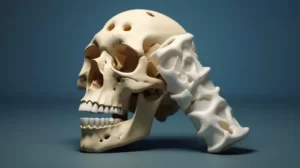As we age, the risk of broken bones increases, and these fractures can pose a significant threat to our quality of life and overall health. However, taking steps to reduce oxidative stress in the body can help protect your bones and lower the possibility of hip fractures.
Reducing Oxidative Stress to Protect Your Bones
Oxidative stress occurs when damage is caused by free radicals, which are molecules formed by pollutants we ingest, or from natural cellular processes related to energy production. Under normal circumstances, antioxidants neutralize the harmful effects of free radicals, but when there aren’t enough antioxidants available, these free radicals can wreak havoc in the bloodstream.
A study by the University of Cincinnati and Harvard examined the link between oxidative stress and the risk of hip fractures. The researchers analyzed data from about 1,000 women over 60, focusing on a specific chemical called FlOP_320. This chemical, created by the interaction of free radicals with DNA and toxic heavy metals, proved to be strongly connected to hip fractures.
With this information in mind, it is worthwhile to explore ways to lower oxidative stress in the body as a means of supporting bone health and reducing the risk of fractures.
Ways to Lower Oxidative Stress
Here are some measures you can take to lower the amount of oxidative stress your bones are exposed to:
- Avoid smoking and exposure to secondhand smoke.
- Limit your exposure to polluted air and environments.
- Eat a diet rich in fruits and vegetables, which are natural sources of antioxidants.
- Limit alcohol consumption, as excessive alcohol intake can increase oxidative stress.
- Consider incorporating antioxidant-rich supplements, such as vitamin C, vitamin E, and selenium, into your daily routine.
- Maintain a healthy weight, as obesity is linked to higher levels of oxidative stress and inflammation.
- Exercise regularly, as studies have shown that moderate physical activity can enhance antioxidant defenses and reduce oxidative stress.
- Get sufficient sleep, as sleep deprivation can contribute to increased oxidative stress and inflammation.
- Manage your stress levels, as chronic stress is associated with elevated oxidative stress.
The Importance of a Balanced Diet for Bone Health
Eating a balanced diet is crucial to maintaining healthy bones and preventing fractures. According to the National Osteoporosis Foundation, a diet rich in calcium, vitamin D, and other nutrients can help support bone health. Some suggested foods for achieving a balanced diet include:
- Dairy products such as milk, yogurt, and cheese
- Leafy green vegetables like kale, spinach, and broccoli
- Fruits, especially those high in antioxidants, like berries, oranges, and kiwi
- Lean proteins such as fish, chicken, and tofu
- Nuts and seeds, which provide healthy fats and vital minerals like magnesium
The Arthritis Foundation also recommends limiting your intake of added sugars, sodium, saturated fat, and trans fat to reduce inflammation and lower the risk of fractures.
The Role of Exercise in Bone Health
Regular exercise is essential for maintaining overall health and wellness, and it is especially important for bone health. Weight-bearing and resistance activities can help to slow down the rate of bone loss and stimulate new bone formation. Some types of exercises that are beneficial for bone health include:
- Walking
- Climbing stairs
- Dancing
- Resistance exercises using weights or resistance bands
- Yoga and tai chi for improving balance, coordination, and flexibility
The American Heart Association recommends getting at least 150 minutes of moderate to vigorous aerobic activity each week and engaging in muscle-strengthening activities at least two days per week.
In conclusion, protecting your bones and reducing the risk of fractures as you age involves a combination of lifestyle modifications, a balanced diet, and regular exercise. By taking these steps to lower oxidative stress, you can improve your chances of maintaining healthy bones and a better quality of life.



